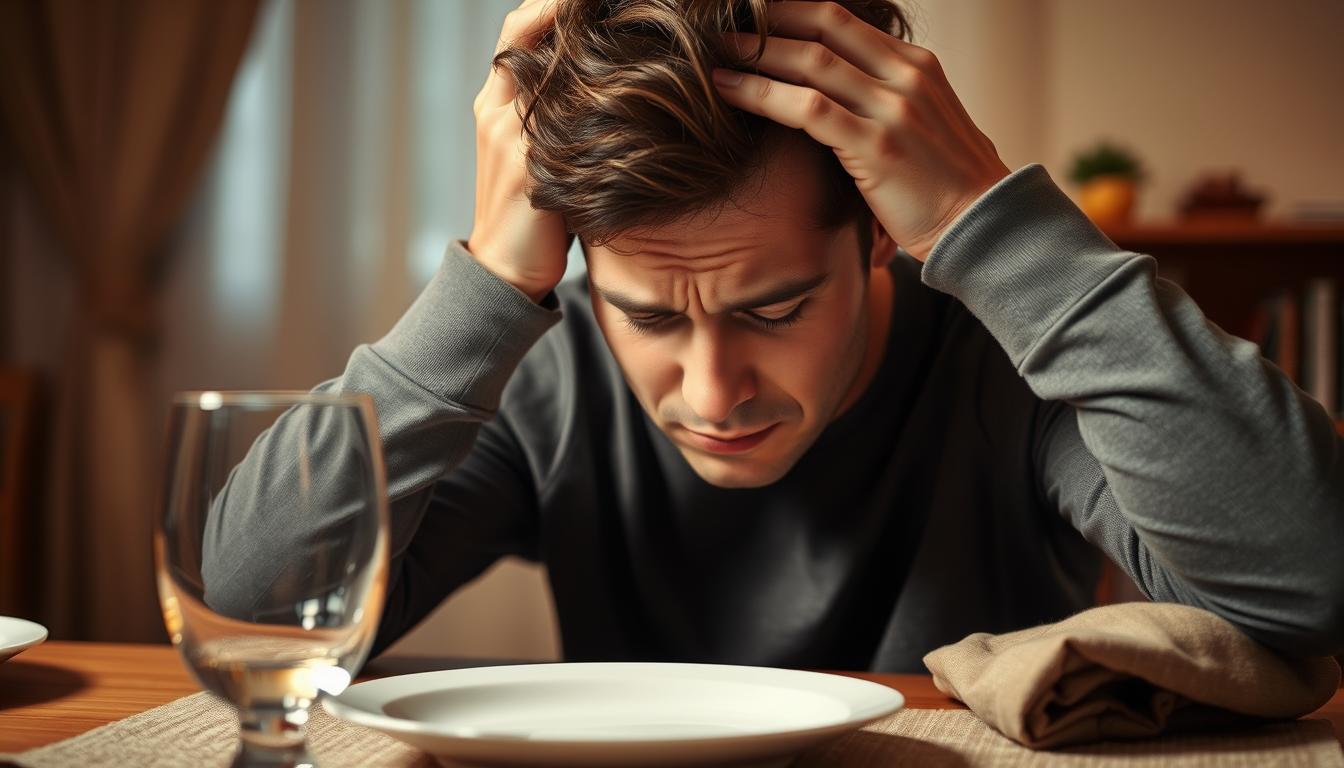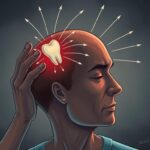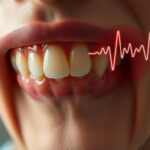Getting a headache after a meal can be puzzling and uncomfortable. It’s a common issue that disrupts daily life. People worry about what might be causing it.
headache after meal
This condition is often called postprandial headache. It can be caused by many things, like what we eat and how our body reacts. Knowing what causes it is key to feeling better and avoiding future headaches.
It might be because of what we eat, food sensitivities, or other health issues. Finding out the main cause is the first step to managing food-induced headache.
Key Takeaways
- Postprandial headache is a condition that occurs after eating.
- Understanding the causes is key to finding relief.
- Dietary habits and food sensitivities can contribute to the condition.
- Identifying the root cause is crucial for management.
- Lifestyle changes can help prevent future episodes.
Understanding Postprandial Headaches
Meal-related headaches are more common than you might think. They can happen for many reasons, like how our body reacts to food. Postprandial headaches happen after we eat a meal.
meal-related headache
What Happens in Your Body When You Get a Headache After Eating
When we eat, our body changes in many ways. Blood flow to the digestive system increases to help digest food. This can sometimes cause a drop in blood pressure. This drop can lead to a headache in some people. Also, certain foods can make blood vessels expand, causing pain.
The chemicals and hormones released during digestion also play a role. For example, eating certain foods can release serotonin. This neurotransmitter can affect blood vessel diameter and lead to headache pain.
How Common Are Post-Meal Headaches?
Post-meal headaches are quite common, affecting many people. Studies show that a lot of people get headaches after eating. Some are more likely due to specific sensitivities or allergies.
| Condition | Prevalence | Common Triggers |
| Postprandial Headaches | Significant portion of the population | Food sensitivities, blood sugar fluctuations |
| Migraine after Eating | Common among migraine sufferers | Tyramine-rich foods, MSG |
Common Causes of Headache After Meal
Getting a headache after eating can be puzzling. It’s important to understand why it happens to find relief. Many things can cause post-meal headaches, from what we eat to how our body reacts.
Blood Sugar Fluctuations
Blood sugar changes can cause headaches after eating. When you eat, especially carbs, your blood sugar goes up.
Hypoglycemia vs. Hyperglycemia
Both hypoglycemia (low blood sugar) and hyperglycemia (high blood sugar) can lead to headaches. Hypoglycemia happens when your blood sugar drops too low, often after eating high-sugar foods.
Insulin Response and Headaches
The insulin response helps control blood sugar. When you eat, your pancreas releases insulin. An exaggerated insulin response can cause hypoglycemia and headaches.
Food Sensitivities and Allergies
Food sensitivities and allergies can also cause headaches after eating. Some foods can trigger an immune response or intolerance, leading to headaches. Common culprits include:
- Gluten-containing foods
- Dairy products
- Nuts and seeds
Identifying and avoiding these foods can help reduce headache symptoms.
Caffeine and Alcohol Effects
Caffeine and alcohol can cause or worsen headaches in some people. Caffeine can cause dehydration and affect blood vessel diameter, leading to pain. Alcohol, especially red wine, contains tyramine, which can cause headaches in sensitive individuals.
food-induced headache causes
Food Triggers That Can Cause Post-Meal Headaches
Some foods are more likely to trigger headaches after eating. Knowing these can help manage post-meal discomfort. For those who often get headaches after meals, avoiding specific foods can be key to relief.
Tyramine-Rich Foods
Tyramine is found in aged, fermented, or spoiled foods. Tyramine-rich foods include aged cheeses like blue cheese and Parmesan, fermented foods such as sauerkraut, and certain wines. These foods can cause headaches in sensitive individuals by releasing norepinephrine.
MSG and Artificial Additives
Monosodium glutamate (MSG) is a flavor enhancer in many processed and restaurant foods. Some people are sensitive to MSG, which can trigger headaches and other symptoms. Artificial additives, including certain preservatives and colorings, can also cause headaches in some.
Nitrates and Preservatives
Nitrates are used in meats like bacon, ham, and hot dogs to extend shelf life and enhance flavor. They can cause blood vessels to dilate, potentially leading to headaches.
Common Foods Containing Nitrates
Processed meats are the main source of nitrates in our diet. Foods like bacon, hot dogs, and deli meats are preserved with nitrates. Knowing these sources can help those who often get headaches after meals.
How Nitrates Affect Blood Vessels
Nitrates can make blood vessels expand, which may cause headache pain in some. Understanding how nitrates work in food preservation and their effects on the body can help in making better dietary choices.
By recognizing and possibly limiting these food triggers, individuals can manage post-meal headaches better. Keeping a food diary can help identify which foods may cause headaches.
Medical Conditions Associated with Eating-Related Headaches
It’s important to know the medical conditions linked to headaches after eating. While some headaches after meals are normal, frequent or severe ones might signal a health issue.
“The link between eating and headaches is complex,” a study on postprandial headaches notes. Certain health conditions can make headaches worse after meals. It’s key to find these conditions to manage them properly.
Migraines and Food Triggers
Migraines are a common headache disorder that can be triggered by certain foods. Food triggers for migraines vary but often include chocolate, aged cheeses, and processed meats. The exact reason why these foods trigger migraines is still a mystery, but it’s thought to involve neurotransmitters and vasoactive substances.
A study in a neurology journal found that nearly 90% of migraine sufferers blame food for their headaches. This shows how important diet is in preventing migraines.
Hypertension and Meal-Related Blood Pressure Changes
Hypertension, or high blood pressure, can lead to headaches after eating. This is especially true if blood pressure changes after meals. Foods high in sodium or caffeine can cause sudden blood pressure spikes, leading to headaches.
Research shows that meal composition affects blood pressure. Some meals can cause big blood pressure increases. This is a big concern for people with hypertension, as diet can help manage blood pressure and reduce symptoms like headaches.
Digestive Disorders and Their Connection to Headaches
Digestive disorders like irritable bowel syndrome (IBS) or celiac disease can also cause headaches after meals. The exact reasons are not fully understood but may involve inflammatory mediators or changes in gut-brain signaling.
A
study found that people with IBS are more likely to have headaches, including migraines, than the general population. This suggests a link between gut health and headache disorders.
Understanding these medical conditions and their link to eating-related headaches is the first step to managing symptoms and improving life quality.
Diagnosing the Cause of Your Post-Meal Headaches
If you often get headaches after eating, finding the cause is key to solving the problem. Diagnosing involves self-monitoring and, if needed, medical evaluation.
Keeping a Food and Symptom Journal
Start by keeping a detailed food and symptom journal. Record everything you eat and drink, along with any symptoms, like headache severity and timing.
What to Track in Your Journal
Track your food intake, including portion sizes and when you eat. Also, note any symptoms, like headache severity, and other factors like stress or physical activity.
Identifying Patterns Over Time
Over time, patterns may emerge that show which foods or situations trigger your headaches. Be patient and persistent, as it may take weeks to notice a pattern.
Medical Tests and Evaluations
If your journaling shows potential food triggers or if your headaches are severe, consult a healthcare professional for further evaluation. They may suggest tests for food allergies, sensitivities, or other conditions that could be causing your headaches.
By combining self-monitoring with medical evaluation when necessary, you can take big steps towards headache relief after meals and preventing headaches after meals in the future.
Effective Remedies for Headaches After Eating
Headaches after meals can be really tough, but there are many effective remedies. Finding the right relief can greatly improve your life by letting you enjoy meals without pain.
Immediate Relief Strategies
When a headache hits after eating, quick relief is key. Staying hydrated with water is a simple yet effective start. Dehydration, caused by some foods or drinks, can lead to headaches.
Also, relaxation techniques like deep breathing or a short walk can ease tension and lessen headache pain.
Over-the-Counter Medications
Over-the-counter (OTC) medications are often the first choice for headache relief. Ibuprofen or acetaminophen can work well when used as directed. But, it’s important to follow the dosage and talk to a doctor if headaches keep coming back.
Natural Remedies and Supplements
Some people turn to natural remedies for headache relief. This can include changing what you eat, or trying supplements and herbs.
Herbal Options for Headache Relief
Feverfew and ginger are herbs used for headaches. Feverfew may reduce inflammation and relax blood vessels. Ginger has anti-inflammatory properties that can help with pain.
Essential Oils and Aromatherapy
Essential oils like lavender and peppermint can help in aromatherapy. Inhaling these oils can relax muscles and improve mood, which may lessen headache severity.
Exploring these remedies can help manage and prevent headaches after meals. This can make dining more enjoyable and improve overall health.
Preventing Headaches After Meals
Understanding why headaches happen after eating is key to preventing them. It involves making dietary changes and being mindful of how you eat.
Dietary Modifications
Changing your diet can greatly reduce post-meal headaches. Avoid foods that can trigger headaches, like those with tyramine, MSG, and nitrates.
Foods to Avoid: Aged cheeses, processed meats, and some wines are common culprits. Reading food labels can help spot potential triggers.
Eating Habits That Can Help
Changing your eating habits can also help prevent headaches. Being mindful of when and how much you eat is important.
Meal Timing and Frequency
Eating smaller, more frequent meals can keep blood sugar stable, reducing headache risk. Skipping meals can lead to low blood sugar and headaches.
Portion Control Strategies
Controlling portion sizes is key to avoid overeating, which can cause discomfort and headaches. Using smaller plates and being mindful of serving sizes can help.
Hydration and Its Importance
Staying hydrated is crucial in preventing headaches. Dehydration can be mistaken for hunger, leading to unnecessary eating. Drinking water throughout the day helps keep hydration levels up.
| Preventive Measure | Description | Benefit |
| Dietary Modifications | Avoiding trigger foods, reading labels | Reduces headache triggers |
| Eating Habits | Meal timing, portion control | Maintains stable blood sugar, prevents overeating |
| Hydration | Drinking water throughout the day | Prevents dehydration, reduces headache risk |
When to See a Doctor About Post-Meal Headaches
If you often get headaches after eating, knowing when to see a doctor is important. While occasional headaches might not be a big deal, some signs could mean a serious problem.
Warning Signs That Require Medical Attention
Some symptoms with postprandial headaches need quick medical help. These include:
- Severe headache pain that is unusual for you
- Headaches with confusion, trouble speaking, or weakness on one side
- Frequent or recurring headaches after eating
- Headaches with fever, stiff neck, or rash
Knowing these warning signs helps figure out if you need a doctor.
What to Expect at Your Doctor’s Appointment
At your doctor’s for postprandial headaches, expect a detailed check-up. This might include:
- Talking about your medical history to find triggers and conditions
- A physical check to look for other health issues
- Tests like blood work or imaging to find causes
Knowing what to expect can make you feel less anxious and more ready for your visit.
Conclusion
Understanding why you get postprandial headaches is key to managing them. By finding out what foods trigger them and knowing about health conditions, you can take steps to feel better.
Managing post-meal headaches means changing your diet, eating habits, and staying hydrated. Keeping a food and symptom journal helps find what triggers your headaches, leading to better prevention.
If you have headaches after eating that won’t go away, see a doctor. They can help figure out what’s wrong and how to treat it.
By controlling what you eat and paying attention to how your body reacts, you can cut down on postprandial headaches. This improves your life quality.
FAQ
What are the most common causes of headache after eating?
Headaches after eating can be caused by many things. These include blood sugar changes, food sensitivities, and certain substances like caffeine, alcohol, and MSG.
How can I identify the specific food trigger causing my post-meal headache?
Keep a food and symptom journal. This helps track your eating and symptoms over time. It makes it easier to find out what food or ingredient is causing your headaches.
Are there any medical conditions associated with eating-related headaches?
Yes, some health issues like migraines, high blood pressure, and digestive problems can cause headaches after eating. Knowing this can help manage your symptoms.
What are some effective remedies for headaches after eating?
There are many ways to feel better. These include over-the-counter meds, natural remedies, and quick relief techniques. Changing your diet and staying hydrated also helps.
How can I prevent headaches after meals?
To prevent headaches, make dietary changes and adopt good eating habits. Control your meal timing and portion sizes, and drink plenty of water. These steps can greatly reduce post-meal headaches.
When should I seek medical attention for my post-meal headaches?
If your headaches are severe, don’t go away, or have warning signs like vision changes or trouble speaking, see a doctor. They can give you the right help and advice.
Can managing food-induced headache also help with managing migraine after eating?
Yes, avoiding trigger foods and eating at regular times can help with both food-induced headaches and migraines after eating.
Are there any specific foods that are commonly associated with meal-related headaches?
Yes, foods high in tyramine, MSG, and nitrates often cause headaches after eating. Knowing these can help prevent postprandial headaches.
Read More – can wisdom teeth cause headaches? What You Need to Know











Leave a Comment